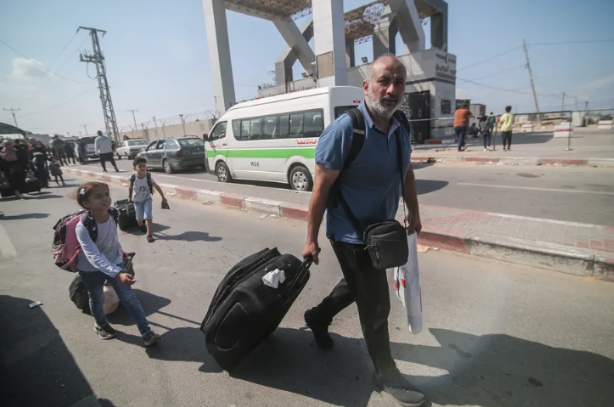Israel
Egypt Navigates Israel War Mediation Amid Gaza Tensions

Amid the ongoing turmoil of the Israel war, Egypt’s Sinai Peninsula hosts an unlikely beacon of hope barely 28 miles from Gaza’s tumultuous border. Here, the al-Arish airport emerges as a poignant symbol, its runways laden with medical supplies, poised to mend the ravages of conflict. Yet this outpost of aid stands in solemn contrast to the reality at the Rafah crossing, where the weight of conflict politics and historical grievances converge, epitomizing the complex tapestry of struggle and hope in the region. As the world grapples with the specter of endless strife, this juxtaposition at al-Arish underscores the overarching quest for resolution in the shadow of an enduring and divisive war.
This is the realm where history’s heavy hand guides the present, where the echoes of old wars shape the cries of the current, and where the storied lands of Egypt find themselves the reluctant custodians of a peace fraught with complexities. At the heart of this modern exodus southward, as Palestinians flee the specter of Israeli assault, lies a question that harkens back to the roots of Arab identity and national struggle.
Egypt’s role in the current Israel-Hamas escalation is a narrative steeped in the irony of kinship and the realities of geopolitical necessity. The Gaza Strip, though geographically divorced from Egypt’s embrace by the vicissitudes of war, remains umbilically tied to it through shared history and the Palestinian cause’s enduring plight.
To understand the labyrinthine corridors of Egypt’s policy is to walk the tightrope of its relations with Hamas, an offshoot of the Muslim Brotherhood — that quintessentially Egyptian organization that has alternately been courted and crushed beneath the wheels of Cairo’s tumultuous politics. The Egyptian government, while publicly denouncing Hamas, engages in shadowed conversations that have, at times, brokered fragile peace.
For decades, this dialogue remained an undercurrent, seldom shaping the surface politics, much like the subterranean tunnels connecting Gaza with Egypt’s Sinai — lifelines for a beleaguered people that double as conduits for the very militancy Cairo seeks to suppress. Egypt’s labyrinthine relationship with Hamas is further complicated by memories of Mohammed Morsi’s brief, Brotherhood-backed presidency and President Abdel Fattah al-Sisi’s subsequent crackdown on the group.
Yet, Sisi’s Egypt has found itself, paradoxically, as a mediator — a role underscored by the United States’ reliance on Egypt to navigate the churning waters of Middle Eastern diplomacy. The Camp David Accords, once a beacon of peace, now seem a mere stepping stone to more complex entanglements of security and economic dependencies that bind Egypt and Israel.
Amid this high-stakes geopolitical chess game, the Palestinians stand as pawns, displaced since 1948, scattered across the globe, ever yearning for a right of return. Egypt, under the shadow of its own economic fragility and internal strife, dares not become a perceived accomplice to this ongoing Nakba, the great catastrophe of Palestinian history.
Even the provision of medical care becomes a quandary of national security and humanitarian impulse. While organizations such as MedGlobal denounce the notion of creating more refugees, the Gazan people’s immediate needs present an urgent moral imperative.
Water — the lifeblood of civilization, now drips from Israeli faucets into Gaza, a cruel reminder of the region’s resource scarcities exacerbated by conflict. Médecins Sans Frontières’ alarms over the water crisis underscore the depth of the humanitarian abyss that threatens to engulf Gaza.
The United States, too, through Secretary of State Antony Blinken’s Middle Eastern sojourn, seeks to chart a course through the treacherous straits of diplomatic engagement. Promises of reopened borders and aid flow as freely as the diplomatic rhetoric, but the Gazans wait, still caught between the hammer of conflict and the anvil of neglect.
What does the future hold for this land where history refuses to be consigned to textbooks, where every stone tells a story of ancient grievances and modern tragedies? As Egypt walks its delicate line between cooperation and condemnation, between historical support for the Palestinian cause and pragmatic alliances, the world watches — wondering whether this latest chapter will be written with the ink of statesmen or the blood of the innocent.
One thing is clear: the sands of Sinai and the streets of Gaza are once again merging into a single, somber narrative of suffering and survival, a testament to a region where the past is never truly past, and peace remains an elusive, flickering mirage on the horizon.












You must be logged in to post a comment Login